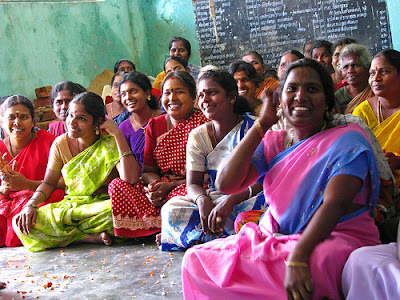 |
Take Meena Hainsa, an Indian Muslim. She was kidnapped, trafficked, sold and kept enslaved in a town in Bhihar, near Nepal's border. She like many girls from poor village families in Nepal, India, and Cambodia are taken to town by middlemen with promises that they will work as fruit sellers. Instead, they are sold to brothels. And even if there was a chance to escape--where would they go? Their own family would not even take them back after learning their daughter lost their virginity, was taken by men.
Given the subject matter, I struggled with the brunch I would pair with the book club's discussion of the book. The women, who come from countries in sub-Saharan Africa, from Cambodia, Thailand, and India, are vastly different in terms of language and culture. Yet, all come from economically impoverished backgrounds and so the idea of serving opulent food was at odds with the women being represented in our reading. Playing host for such a book was proving more difficult than I thought.
So as I drove home from a busy morning downtown, I stopped at the new Whole Foods grocery store in Inner Bay in Seattle. Whole Foods, wholesome foods, and then I knew what I would cook. The book is about subsistence, the raw elements of human nature are all we have left when we find ourselves abandoned. And it is their strength of character that makes these women survive when all seem against them.
Subsistence is simple. Subsistence is fresh. Subsistence is to satisfy basic needs. So, I chose the egg. I cooked simple french omelets. Cheese. I shredded a bit of cheese on top, a small luxury: Morbier A.D.C. raw Mile, Les Trois Comtoi. Apparently morbier cheese is known for how it is treated. During the cheese processing, beer, water, or wine is poured over the rind and so the cultured cheese takes on a kind of nutty flavor.
I used salt and pepper to flavor the omelet and a little butter. The very basic of basic seasons. I bought a loaf of fresh bread from Whole Foods as well. Heated in the oven so the crust was flaky. Then despite extra carbohydrates, I fried potatoes as well, adding a little salt and pepper as well as garlic for spice.
On the table I had fresh grapes and strawberries, and a bit of watermelon. I made a pot of Darjeeling tea as well as brewed some coffee.
Bread, egg, potato, fruit. Of course the meal was a luxury far more than many of the women in this book had.
Those of us who read the book know that it was a stroke of luck that we were born here in the US versus in the small villages of Ethiopia, Congo, or Cambodia. But the crux of a book like this is to realize that we have the capacity to help, to change things on a small scale or even a large scale. A book like this opens the world wide to knowing why and how.
Nicholas Kristof's columns in the New York Times
Nicholas Kristof's channel on YouTube
Sunday Brunch Menu
French omelet with Shredded cheese: Morbier A.D.C. raw Mile, Les Trois Comtois
Potatoes seasoned with salt, pepper, and garlic
Bread
Butter and French Cantalet cheese
Goat cheese
Strawberries
Red grapes
Watermelon
Coffee
Darjeeling tea
No comments:
Post a Comment